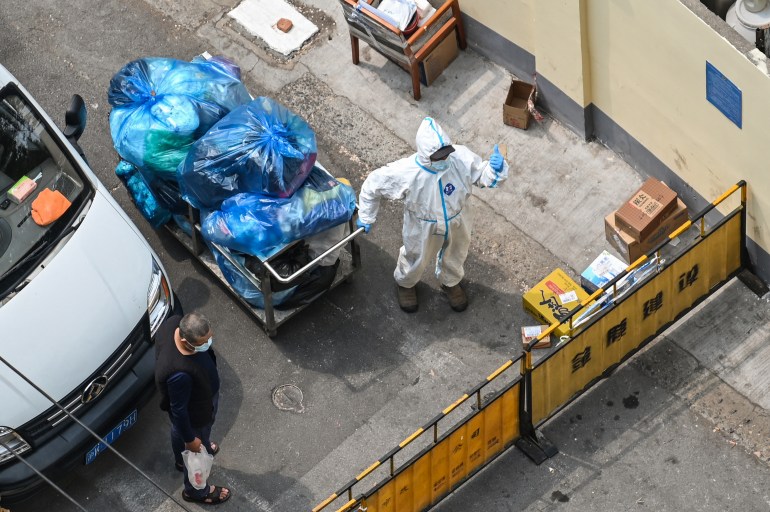Beijing closes more venues as anger at Shanghai lockdown grows | Coronavirus pandemic News
China’s capital Beijing closed more gyms, malls, cinemas and apartment blocks on Friday, with authorities ramping up contact tracing to contain a COVID-19 outbreak, while resentment at the draconian month-long lockdown in Shanghai continued to grow.
In the finance hub, fenced-in people in various districts have been protesting against the lockdown and difficulties in obtaining provisions by banging on pots and pans in the evenings, according to a Reuters news agency witness and residents.
A video shared on social media, whose authenticity could not be immediately verified, showed a woman warning people via a loud-hailer not to do so, saying such gestures were being encouraged by “outsiders”.
The Shanghai government did not immediately respond to a request for comment.
Beijing’s Chaoyang district, the first to undergo mass testing this week, started the last of three rounds of screening on Friday among its 3.5 million residents. Most other districts are due for their third round of tests on Saturday.
Chaoyang, accounting for the biggest share of cases in the capital’s current outbreak, stepped up measures to curb transmissions as it declared more neighbourhoods to be at risk.
People who had recently visited venues in such areas have received text messages telling them to stay put until they get their test results.
“Hello citizens! You have recently visited the beef noodles & braised chicken shop in Guanghui Li community,” one such text read. “Please report to your compound or hotel immediately, stay put and wait for the notification of nucleic acid testing.”
“If you violate the above requirements and cause the epidemic situation to spread, you will bear legal responsibility.”

At test sites, staffers with blue aprons urged people queueing to be tested to observe a 2-metre social distancing rule as loud-hailers reminded crowds to keep their masks on.
Additional apartment blocks were sealed and certain spas, KTV lounges, gyms, cinemas and libraries, and at least two shopping malls closed on Friday, while couriers and food delivery staff were refused entry to some residential compounds.
Companies such as JD.com, an e-commerce platform, have been striving to keep residents well supplied.
The head of one of its logistics centres on the outskirts of Beijing, 32-year-old Ming Tang, said delivery volumes have increased by 65 percent since the first cases emerged on April 22, and 80 percent of the parcels are food-related.
“The effort of delivering parcels on time and long working hours put a lot of pressure on our couriers,” he said.
Beijing reported 49 cases on April 28, versus 50 the previous day.
Shanghai reported 52 new COVID-19 deaths on April 28, up from 47 a day earlier, the local government said on Friday. It recorded 9,545 new asymptomatic cases on April 28, versus 9,330 a day earlier, while symptomatic cases rose to 5,487 from 1,292.
While some delivery bottlenecks have been eased in the city, criticism of the government has continued to grow, particularly over the subject of government food provisions. Residents in some districts complain their rations have been less frequent than in others, taking to social media to compare deliveries.
The lockdown is driving scores of foreign residents to flee mainland China’s most cosmopolitan city.
While no official statistics are available for departures in recent weeks, pet movers, property agents and law firms say they are seeing a sharp uptick in queries, while online groups swapping advice on how to leave have swelled.
“Until the lockdown I really couldn’t feel the authoritarian government, because you’re more or less free to do what you want and I never really lived oppressed,” said Jennifer Li, a foreigner who is making plans for her family to leave the city that has been their home for 11 years.




